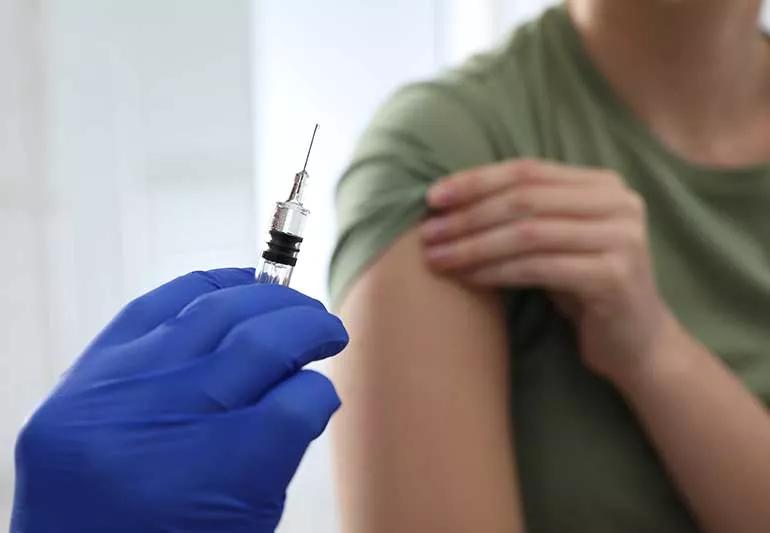Although allergic reactions are usually mild, taking your meds and avoiding exercise can help

Image content: This image is available to view online.
View image online (https://assets.clevelandclinic.org/transform/ee9a5a38-af98-4600-af49-0ed3f13fd077/Allergy-Shot-Reactions-1308378600770x533-1_jpg)
Doctor preparing to administer shot.
Your medicine cabinet is loaded with antihistamines, and you never go anywhere without a package (or three) of tissues. Maybe your healthcare provider has even suggested allergy shots. This lesser-known treatment for allergies can relieve the sneezy, itchy and watery torture caused by allergens. Some people even see their symptoms disappear entirely.
Advertisement
Cleveland Clinic is a non-profit academic medical center. Advertising on our site helps support our mission. We do not endorse non-Cleveland Clinic products or services. Policy
Known as allergen immunotherapy, allergy shots help treat common allergies to substances such as pollen, dust mites, pet dander and mold spores. They may also be helpful if you’re allergic to the venom from certain stinging insects, like bees, hornets, wasps and yellow jackets.
But maybe you’ve heard that people have negative reactions to these shots. Allergy specialist Mark Aronica, MD, explains why this happens, what to watch for and how you may be able to prevent reactions from allergy shots.
Allergy shots are a treatment for allergies that introduce very small amounts of allergens into your body via injection (shot). Your provider tailors your specific cocktail of allergens in the shots, depending on what allergies you have.
“The shots are a form of immunotherapy that help decrease or even stop allergy symptoms,” Dr. Aronica explains.
By exposing your body to the tiny amounts of allergens in the shots, you build up a tolerance to them. Then, your body doesn’t react as strongly to the allergens when you encounter them in your life, like during allergy season.
This treatment requires many shots, usually weekly, over a period of years. Your provider slowly increases the amount of allergens in the shot. Once you’ve reached the maintenance phase (the highest dose), you’ll need to get the shots less often.
Advertisement
A course of allergy shots always starts out with very tiny doses of the allergens. The goal is to stimulate your immune system enough to recognize the allergens but not cause a serious reaction.
But negative reactions to allergy shots sometimes happen.
“We’re giving people things they’re allergic to, and there’s always that risk of a negative reaction,” Dr. Aronica says. “Done appropriately, allergy shots desensitize the person to the allergen trigger. But sometimes, their body reacts too strongly to the allergens in the shot.”
Reactions can range from very minor swelling at the site of the shot to life-threatening anaphylaxis. But Dr. Aronica notes, “Serious reactions to allergy shots are less common — generally considered to be less than 1%.”
The most common reaction to allergy shots is swelling at the injection site. This swelling can range from pea-sized to golf ball-sized, but it’s usually gone within 48 hours. You may also experience itching and/or hives over large parts of your body.
Less common but more serious reactions include:
“If you’re going to have a negative reaction, you’ll most likely have it within 30 minutes of the shot,” Dr. Aronica states. That’s why you’re required to wait 30 minutes before leaving your provider’s office. At the end of the 30 minutes, a provider checks you for any troublesome symptoms.
In very rare cases, someone can have a delayed reaction after an allergy shot up to a couple of hours later. Such reactions may range from mild to severe.
What about an allergy shot reaction the next day? “That would be extremely unusual,” Dr. Aronica says.
But to be safe, people on allergen immunotherapy get a prescription for an epinephrine autoinjector (EpiPen®) to keep on hand. This injection device is pre-filled with epinephrine, which treats severe allergic reactions.
People with asthma are at higher risk of a reaction to allergy shots.
“Stay on your asthma meds and make sure your asthma is well-controlled before having these shots,” Dr. Aronica advises. Before each shot, you’ll get a peak flow test, which measures how quickly air exits your lungs when you exhale. This test makes sure your asthma is under control.
If you’re on beta-blockers or other medicines for high blood pressure, you may also be at higher risk for a reaction.
Advertisement
But anyone can have a reaction to allergy shots, Dr. Aronica notes. “There’s really just no way to predict that ahead of time, which is why we have precautions in place.”
Here are some things you can do to minimize your chance of an allergy shot reaction:
“Once you’ve reached the maintenance phase in your course of allergy shots, your risk of a reaction goes down significantly,” Dr. Aronica says. And though it may be inconvenient to get weekly shots over many months or years, you’ll likely see big-time relief from your allergies if you stick with the treatment.
Advertisement

Delivered every Tuesday!
Sign up for our Health Essentials emails for expert guidance on nutrition, fitness, sleep, skin care and more.
Learn more about our editorial process.
Advertisement
Most recommended precautions center around minimizing bruising or swelling
Even one drink can have an impact on your cognitive function leading to slurred speech, blurred vision and impaired memory
Understand who may (and may not) benefit
Lorem ipsum dolor sit amet. Et odio Quis vel ipsam omnis eum alias deleniti et placeat impedit non voluptas galisum hic autem enim et cupiditate aliquid. Est beatae quidem non facilis autem ut commodi nisi aut tempore rerum et dolores voluptatem cum enim optio id sapiente quasi. Ad laboriosam officiis 33 cupiditate sequi ea voluptatum consectetur qui necessitatibus voluptate et quasi doloremque et facere explicabo quo explicabo officia
Seeking help through therapy can be an important step in improving your quality of life when you have UC
Type 2 diabetes isn’t inevitable with these dietary changes
Applying a hot or cold compress can help with pain
Pump up your iron intake with foods like tuna, tofu and turkey